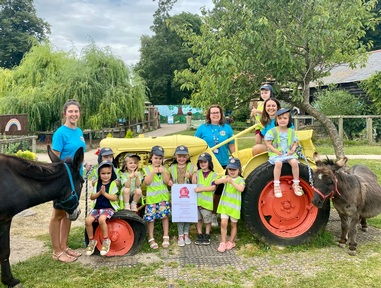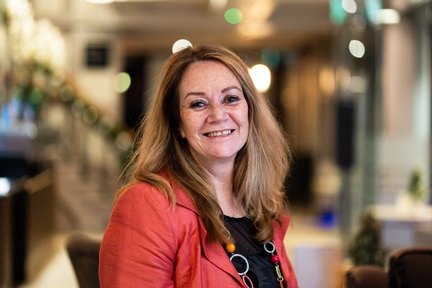Duchess of Cambridge takes new KS3 science class on early years development
The Duchess of Cambridge has taken a class about neuroscience and early childhood development at a London school, to help promote the teaching of early years to the country’s 11-to-14 year-olds.
![]() Duchess of Cambridge during early years science lesson at Nower High School. Credit: Kensington Palace
Duchess of Cambridge during early years science lesson at Nower High School. Credit: Kensington Palace
The royal's visit to a Key Stage 3 (KS3) science class at Nower High School in Harrow, saw the mum of three attend a lesson developed by researchers from Oxford University's department of psychiatry about how the first five years of children's lives can impact an individual's entire life.
Duchess: 'A real passion of mine'
As mother to the future king of England, the Duchess, told the class of 12 and 13-year-olds: “It's a real passion of mine. Learning about babies' brains, about how our adult brains develop and how our early childhood influences the adults we become.”
Oxford academics involved almost 4,000 children at schools throughout the UK in three newly-created science lessons about brain development in early childhood.
SEEN (Secondary Education around Early Neurodevelopment) is a research project which piloted the early years curriculum for 3,703 Key Stage 3 pupils (11-14 years-olds) at 21 schools in England.
Three KS3 science lessons covered topics including brain development, the caregiver's role in early years development and the ongoing development of the brain throughout life.
The results of the SEEN lessons, (published by researchers at Oxford University in its SEEN report on 24 November) found over 90 per cent of pupils knew at least one way that a caregiver should speak to a baby to promote their language development.
Some 80 per cent of pupils understood that a child’s environment affects their development. Eighty per cent correctly reported that a child’s brain develops fastest in the first five years of life.
Academic: Early years can be taught 'in the same way' we teach about poor diet
Dr Elizabeth Rapa, co-investigator of SEEN and senior scientist at University of Oxford, said: “This ground-breaking project could improve the lives of children for generations.
“In the same way that we teach children about the risks of smoking or poor diet, children also need to know about why experiences in our early years are so important for later health. We hope that the key principles of early child development into KS3/4 (aged 11-14) will now be taught in more schools.”
The SEEN project’s report revealed that when asked whether children their age should be taught about early years development, one child stated that such lessons could help school pupils ‘understand how babies’ brain develop and how to make sure you communicate with them properly.’
Pupil: Baby talk 'important' to brain development
One pupil said: “I told my mum what we learnt about in the lesson like what stages a baby's brain develops the most and how playing games or talking with exaggerated facial expressions helps with serve and return interactions, memory and good brain development.
'Baby talk is more than just playing, it is an important thing to baby's brain development.'
Another child stated: ‘If we learn it around 15-18 we would remember more for when we have kids.’
Dr Louise Dalton, co-investigator of SEEN and consultant clinical psychologist at University of Oxford, said: “The change we have seen in children's understanding of how to promote children's development is astonishing, particularly in such a short period of time.
“The potential to easily scale up the programme to reach all children across the country, instilling this core knowledge in carers and parents of the future is so important.”
Charity: We must 'rethink our perception of early years'
Last summer, the Duchess launched The Royal Foundtion Centre for Early Childhood, which emphasizes the importance of the early childhood years when it comes to educational development as well as long-term wellness.
Felicity Gillespie, director of early years education charity Kindred2, said: “The most significant levelling up that's needed in the country is to rethink our perception of early years. A child's development at 22 months serves as a strong predictor of education outcomes at age 26.
“Working with 11-14-year-olds to educate them and to transform their own understanding early enough in their lives, means that we are not leaving these lessons too late. The hope is that the striking results of this programme will now be replicated in more secondary schools across the country.”
Latest News
 24-Apr-24
Find out the top nurseries in 2024
24-Apr-24
Find out the top nurseries in 2024
 06-Jun-23
UK's top nurseries in 2023 revealed
06-Jun-23
UK's top nurseries in 2023 revealed
 16-Dec-22
Winter Wonderland: Ice sculptures, aerial acrobatics and white knuckle rides
16-Dec-22
Winter Wonderland: Ice sculptures, aerial acrobatics and white knuckle rides
 28-Nov-22
5 mins with Caroline Wright, early childhood director at Bright Horizons
28-Nov-22
5 mins with Caroline Wright, early childhood director at Bright Horizons
 25-Nov-22
Camilla gives nursery children Paddington bears left as tribute to Queen Elizabeth II
25-Nov-22
Camilla gives nursery children Paddington bears left as tribute to Queen Elizabeth II